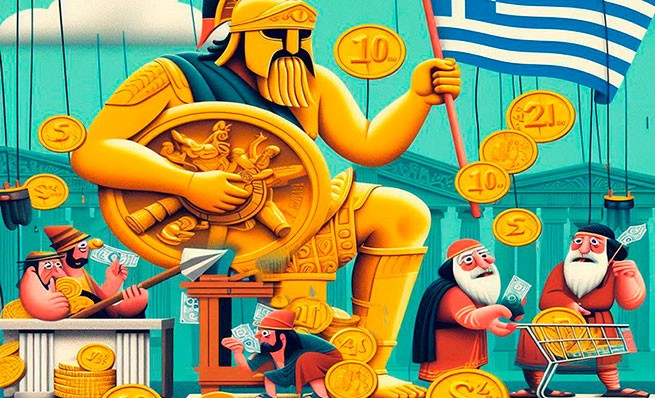Kyriakos Mitsotakis, speaking at a plenary session of parliament on the issue of price increases, argued that the price of feta in our country “is 6.28 euros,” which is lower than in the UK, Spain and Portugal, but Greek citizens live in a different reality.
However, literally immediately he received a wave of powerful criticism, since in fact the prices for feta in Greek stores are 50-100% more expensive.
Πήγα σε τρία σουπερμάρκετ να αγοράσω τη “φέτα Μητσοτάκη” των 6.28 ευρώ αλλ ά είναι σε έλλειψη.
Έλλειψη ειλικρίνειας και σεβασμού προς εσάς. pic.twitter.com/zqWCjEcbM9— Stefanos Kasselakis – Στέφανος Κασσελάκης (@skasselakis) May 25, 2024
Opposition leader Kasselakis, after the Prime Minister of Greece said that feta in the country costs 6.28 euros/kilo, ran to look for it in supermarkets. I went to three, but Mitsotakis feta for 6.28 euros was in short supply. Sellers called this price fairy tales, the cheapest at 9.85, and mostly from 11 euros. Millionaire Kasselakis could not find Feta “according to his budget” and decided to write a letter to Ursula asking for help.
The numbers are telling, and they speak volumes about the real economy: in a country with purchasing power parity EU is only 67%, the prices of all products are shocking and it really shows that we are at “Day of Europe”
Tickets, electronic media, fuel, transportation, food, telecommunications and everything you can imagine in everyday life are not just expensive in Greece, but at outrageous prices.
Ελλάδα: Top40 διαφορών τιμών απ την #ΕΕχώρας με αγορ.δύναμη στο 67% του ΜΟ της ΕΕ:
▫️Αερ.Εισιτήρια:+160%
▫️Εξοπλ.PC-PC: +55%,+48%
▫️Καύσιμα:+41%
▫️Μεταφορές:+34%
▫️Τηλέφωνα:+22%
▫️Τηλεπικοινωνιες:+18%
▫️Βρεφ.Ρούχα:+15%
▫️Γυναικεία Ρούχα:+11.6%
▫️Αρνί, Ελαιόλαδο:+10.2%#ακρίβεια pic.twitter.com/6Cx7chS5T9— Proper Greek Analyst (@propergranalyst) May 25, 2024
Greece – TOP 40 goods and services, prices for which differ from the EU average:
- Airplane tickets:+160%
- Computer peripherals: +55%,
- Computers +48%
- Fuel:+41%
- Transportation:+34%
- Telephone services:+22%
- Telecommunications:+18%
- Children's clothing:+15%
- Women's clothing: +11.6%
- Sheep meat, olive oil: +10.2%
“100,000 auctions are planned for 2024, which indicates the current situation, said INKA representative Panagiotis Georgiadis. – According to the AADE, more than 4,000,000 of our fellow citizens owe a total of 106 billion euros in outstanding debts. (…) A significant portion of Greek consumers were forced to effectively stop making payments. The Greek consumer has cut spending by about 50%, both quantitatively and qualitatively, because there is clearly not enough money.”







More Stories
Six Greek companies in the top 10 European companies with the best working environment
Artificial intelligence in the service of treating snake bites (video)
Meteorologists – "panic predictors"